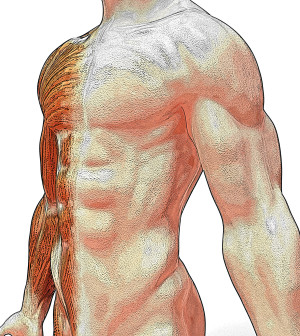- Could Your Grocery Store Meat Be Causing Recurring UTIs?
- Are You Making This Expensive Thermostat Error This Winter?
- Recognizing the Signs of Hypothyroidism
- 10 Strategies to Overcome Insomnia
- Could Artificial Sweeteners Be Aging the Brain Faster?
- Techniques for Soothing Your Nervous System
- Does the Water in Your House Smell Funny? Here’s Why
- Can a Daily Dose of Apple Cider Vinegar Actually Aid Weight Loss?
- 6 Health Beverages That Can Actually Spike Your Blood Sugar
- Treatment Options for Social Anxiety Disorder
Staying Active May Help Prevent Dementia


Being physically active in middle age appears to help reduce your risk for Alzheimer’s disease and other types of dementia, suggest the findings from two new studies.
“In our studies, we found that physical exercise at various levels, especially in midlife, is beneficial for cognitive function,” Dr. Yonas Geda from the Mayo Clinic, said in an Alzheimer’s Association news release.
“These are intriguing results, but they are not yet conclusive. More research is needed to determine the extent and nature of physical activity in protecting against MCI [mild cognitive impairment] and dementia,” Geda added.
One study included 280 seniors who were asked about their physical activity levels over their lifetime. The median age of the study volunteers was 81, which means half were under that age and half were older than 81. All of the study participants had early signs of memory and thinking problems (mild cognitive impairment). People with mild cognitive impairment have a higher risk for Alzheimer’s disease.
After about three years, the researchers found that people with a history of moderate physical activity in middle age had a significantly decreased risk of developing dementia.
Light or vigorous exercise in middle age, or any level of physical activity later in life was not associated with a decreased risk of mild cognitive impairment progressing to dementia.
The second study included 1,830 older adults with normal memory and thinking abilities who were asked about their physical activity levels in midlife and late life and then followed for an average of just over three years.
Light physical activity in midlife and late life was associated with a decreased risk of developing mild cognitive impairment, as were vigorous midlife and moderate late-life physical activity.
Neither study was designed to prove that exercise could directly cause a decline in the rates of dementia or Alzheimer’s; they were designed to find a link between these factors.
Both studies were conducted by Mayo Clinic researchers and presented Monday at the Alzheimer’s Association International Conference in Copenhagen, Denmark. Findings presented at meetings are generally viewed as preliminary until published in a peer-reviewed journal.
“Determining more specifically the factors that raise and lower risk of Alzheimer’s disease and other dementias is an essential component in our battle against the Alzheimer’s epidemic,” Heather Snyder, the Alzheimer’s Association director of Medical and Scientific Operations, said in the news release.
“We are now getting a more clear idea of the opportunities for risk reduction through behavior changes and other health factors. We’re learning that Alzheimer’s risk and protective factors may change over the course of our lives,” she said of the studies.
More information
The U.S. National Institute on Aging has more about Alzheimer’s disease risk factors and prevention.
Source: HealthDay
Copyright © 2026 HealthDay. All rights reserved.










